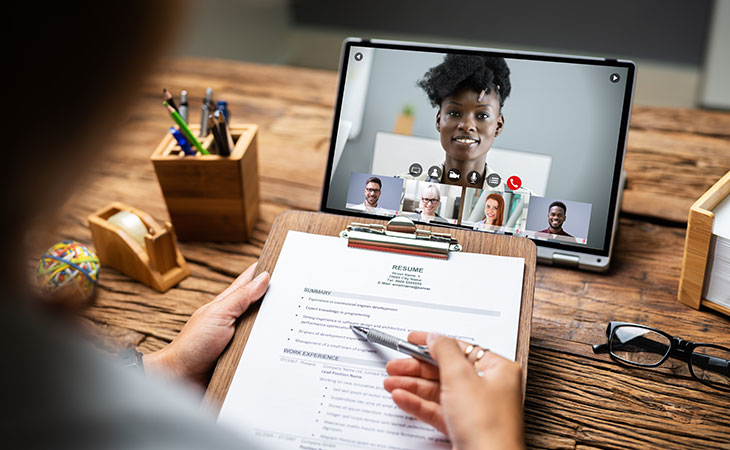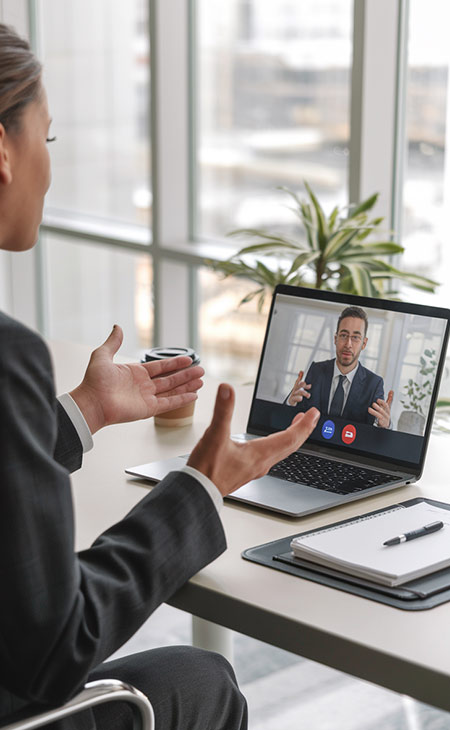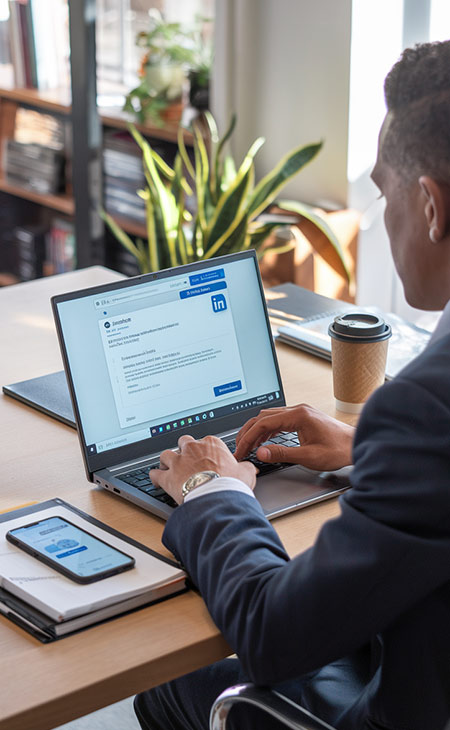Welcome to our “Interview Cheat Sheet,” the ultimate guide designed to empower job seekers and recruiters alike with the strategies needed for success in the interview process. Whether you are stepping into the job market for the first time or looking to refine your interviewing skills, this post is tailored to help you excel.
Interviews are the gateways to new career opportunities, and being well-prepared is key to opening these doors. This cheat sheet highlights the importance of preparation, providing you with actionable insights and proven techniques to increase your chances of making a memorable impression.
Throughout this post, you will learn how to research companies effectively, answer common interview questions with confidence, and follow up strategically to keep your candidacy top of mind. Each chapter is designed to build your understanding and skills, ensuring you walk into every interview prepared and leave with a sense of accomplishment.
Read on to discover how to navigate the complexities of the interview process and approach your next interview with the assurance and professionalism that stand out to employers.
Let’s jump right in!
Chapter 1: Understanding the Interview Process
Embarking on the job interview journey can be both exhilarating and daunting. Whether you’re a seasoned professional or stepping into the job market for the first time, understanding the interview process is crucial to navigating it successfully. This chapter demystifies the complexities of interviews, offering you a clear roadmap of what to expect and how to excel.
From defining what an interview really entails to exploring its varied forms—such as behavioral, technical, and panel interviews—this chapter lays the foundational knowledge you need. You will learn not only the structure of interviews but also the strategic purposes they serve for employers. By the end of this chapter, you’ll gain a comprehensive understanding of the mechanics behind the interview process and how you can align your preparation to meet and exceed the expectations of your potential employers.
Armed with this knowledge, you’ll be better equipped to approach your next interview with confidence and insight, making every opportunity count. Let’s dive in and uncover the essentials of the interview process, ensuring you’re prepared to tackle what lies ahead in your career journey.
What is an interview?
An interview is a critical component of the job application process, serving as a bridge between a potential employer and a candidate. It is structured as a formal yet personal dialogue where job seekers present their qualifications, experiences, and personality traits, aligning them with the needs and values of the organization. This exchange is not only about assessing technical skills but also about gauging how a candidate might fit into a team or contribute to the company culture over the long term.

At its simplest, an interview allows an employer to verify the details provided in a resume and cover letter—qualifications, experiences, and achievements. However, the depth of an interview goes beyond these elements. Employers use interviews to observe a candidate’s interpersonal skills, problem-solving abilities, and capacity for critical thinking—all vital for most modern workplaces. Each question and interaction is an opportunity for candidates to demonstrate how they can add value to the team and help the organization achieve its goals.
Different types of interviews serve different purposes. For instance, behavioral interviews are designed to delve into a candidate’s past experiences and behaviors as indicators of future performance. Candidates are asked to describe situations where they applied key skills such as leadership, teamwork, or conflict resolution, providing tangible evidence of their capabilities and how they handle workplace challenges.
Technical interviews, prevalent in industries like engineering, software development, and data analysis, focus sharply on the specific abilities required for technical roles. Candidates might be asked to solve problems, write code, or design systems during the interview to demonstrate their proficiency and thinking processes directly relevant to the job at hand.
Panel interviews involve multiple members of the company, often from various departments, and can include potential coworkers as well as managers. These interviews assess a candidate’s ability to communicate and interact with diverse groups, and they provide a dynamic view of how the candidate might fit into the existing team structure.
Moreover, the rise of remote work has popularized telephone and video interviews as preliminary screening tools or even as complete interview solutions. These formats test a candidate’s ability to communicate clearly and effectively in a remote environment, which is an increasingly important skill in today’s global workforce.
Understanding the various interview formats and what each entails can empower candidates to better prepare and adapt their approach. Tailoring your preparation and presentation to the specific type of interview can greatly enhance your ability to convey your strengths and ultimately secure the job offer.
What is the purpose of interviews?
The purpose of an interview transcends the basic act of vetting a candidate’s qualifications. It is a nuanced process designed to evaluate a multitude of factors that contribute to successful employment. Central to this process is the employer’s goal of understanding who the candidate is beyond their resume. Interviews provide a dynamic platform for candidates to demonstrate their problem-solving skills, adaptability, and potential for growth within the company.
At a fundamental level, interviews help employers ascertain if the candidate’s professional skills align with the job requirements. This alignment is crucial, as it ensures that the person hired can effectively handle the tasks and responsibilities of the position. However, the scrutiny during an interview often extends into how a candidate’s personal attributes and work style would mesh with the company’s culture and values. Employers look for individuals who not only have the right skills but also embody traits that harmonize with the team they will join and the broader organizational ethos.
Moreover, interviews serve as a two-way street. While they allow employers to judge a candidate’s suitability for the role, they also provide an opportunity for candidates to evaluate the employer. This aspect of interviews is becoming increasingly significant in a job market where candidates often weigh multiple offers. Candidates use interviews to gauge whether the company’s environment, values, and growth opportunities align with their own career goals and personal values.
From an employer’s perspective, the interview is also a strategic tool for reinforcing the company’s brand and attracting top talent. A well-conducted interview can enhance a candidate’s perception of the company, making it a more desirable place to work. Employers can use interviews to sell the role and the benefits of joining their team, highlighting aspects of company culture, career development opportunities, and other benefits that set them apart from competitors.
Understanding the multifaceted goals of interviews can significantly impact how both employers and candidates approach the interview process. For employers, it underscores the importance of a well-structured and thoughtful interviewing strategy that accurately assesses candidates while also promoting the organization as a top employer. For candidates, it highlights the importance of preparation and the need to present oneself authentically, addressing not only the requirements of the role but also demonstrating a fit with the company culture and values.
In this chapter, we’ve explored the fundamental aspects of the interview process, providing you with a solid understanding of what interviews entail and their significant role in the hiring cycle. From different interview types to the overarching goals they serve, both for employers and candidates, we’ve laid the groundwork for approaching interviews with a strategic mindset.
As you progress through the subsequent chapters, you’ll build upon this foundation, learning how to effectively prepare for interviews, handle common questions, and ultimately make a lasting impression. Stay tuned for in-depth strategies in Chapter 2, where we will delve into the crucial preparations necessary before stepping into any interview.
Chapter 2: Before the Interview
Preparation is key to success, and nowhere is this truer than in the process of interviewing for a new job. In this chapter, we delve into the essential steps you should take before ever stepping into the interview room. You’ll learn how to thoroughly prepare yourself to not only impress your potential employers but also to ensure that the role and company align with your career objectives and personal values.
From researching the company’s background to choosing appropriate attire, each step in your preparatory process is designed to build your confidence and enhance your presentation. This chapter will guide you through a series of strategic preparations, each aimed at showcasing your best self and ensuring that you are as informed and ready as possible. By the end of this chapter, you will be equipped with all the tools necessary to approach your interview with poise and a deep understanding of both the role and its requirements.
As you gear up for your interview, consider each of the following steps as essential milestones on your path to success. These preparatory actions are designed to fully equip you with the knowledge, materials, and mindset needed to make a powerful impact during your interview. Let’s explore these key steps to ensure you arrive well-prepared and confident.
Research the Company’s Background

Delving into the company’s history, mission, and achievements provides a solid foundation for your interview preparations. This research helps you understand the company’s position in the industry and its competitive landscape. It is crucial to tailor your answers to show how you can contribute to its success. Exploring their website, checking their ‘About Us’ page, and reading up on their core values and business objectives are excellent starting points.
Review Recent Company News
Staying informed about recent developments within the company can give you an edge in the interview. It shows your interest in the company’s activities and can help you initiate meaningful conversations with the interviewer. Look for press releases, news articles, and significant announcements on their official social media channels to get up-to-date information that might impact your role or the company as a whole.
Understand the Company Culture
Grasping the company’s culture is key to demonstrating your potential fit within their team. Company culture encompasses the organization’s working style, values, and the kind of interpersonal relationships it fosters among employees. This insight can be gathered from the company’s website, social media presence, and reviews from current and past employees on platforms like Glassdoor. Reflecting your understanding of their culture in your responses can significantly align you with the company’s ethos.
Analyze the Job Description
Careful analysis of the job description allows you to identify what the employer is looking for in a candidate. This step is vital for understanding the responsibilities and expectations associated with the role. Pay attention to the listed skills, required experiences, and any specific competencies mentioned. This knowledge will help you emphasize relevant experiences and skills during the interview, directly addressing the needs of the position.
Identify Key Skills and Requirements
Identifying the key skills and requirements mentioned in the job description helps you tailor your interview responses and focus on what matters most to the employer. Highlighting how your background aligns with these key skills during the interview can demonstrate your suitability and readiness for the role. Additionally, consider how you can provide concrete examples that showcase your proficiency in these areas, such as discussing specific projects or achievements.
Prepare Your Elevator Pitch
Crafting a concise and compelling elevator pitch is crucial for making a strong first impression. This brief summary of your professional background should highlight your key achievements, skills, and what makes you the ideal candidate for the position. Aim to deliver it in less than a minute, focusing on elements that relate directly to the job you’re applying for. Your pitch should convey enthusiasm, professionalism, and an understanding of how your goals align with those of the company.
List Questions to Ask the Interviewer
Having a set of thoughtful questions prepared for the interviewer can demonstrate your interest in the role and your proactive nature. These questions might relate to specifics about the job, the team you’ll be working with, or the company’s future plans. Asking insightful questions not only shows your engagement but also helps you assess if the company and the position are the right fit for your career aspirations.
Arrange Your Portfolio
For many positions, particularly in creative or technical fields, bringing a well-organized portfolio can significantly enhance your interview. Ensure that your portfolio is up-to-date and showcases your best work, tailored to the position and company you’re applying for. Include any relevant projects, works-in-progress, and professional documentation that demonstrate your skills and growth in your field. Presenting a tangible representation of your achievements can be a powerful tool in validating your qualifications.
Check Your Social Media Profiles
In today’s digital age, it’s common for employers to review candidates’ social media profiles as part of the hiring process. Before your interview, review your profiles from an employer’s perspective to ensure they convey a professional image. Update privacy settings to manage what’s visible, and consider enhancing your LinkedIn profile with recent achievements, skills, and a professional headshot, making sure all content is appropriate and reflects well on you as a professional.
Plan Your Route and Transportation
Minimize day-of-interview stress by planning your route and transportation options in advance. Determine how long it will take to get to the interview location, considering potential delays, and plan to arrive early. This allows you some extra time to relax and prepare mentally before the interview starts. If the interview is virtual, test your technology setup, including camera, microphone, and internet connection, well ahead of time to ensure everything operates smoothly.
Organize Necessary Documents
Before heading to the interview, ensure you have organized all necessary documents. This includes multiple copies of your resume, cover letter, references, and any certifications or educational documents relevant to the job. Place these items neatly in a professional folder or binder, which you can easily access during the interview. Having these documents at hand not only shows your preparedness but also provides the interviewer with tangible proof of your qualifications and achievements.
Conduct a Mock Interview

A mock interview is an excellent way to prepare for the real thing. It helps you practice your responses to common interview questions and refine your delivery. You can conduct a mock interview with a friend, family member, or mentor who can provide constructive feedback on your answers, body language, and overall demeanor. This practice can help alleviate nervousness and make you more comfortable during the actual interview.
Review Your Resume and Cover Letter
Take the time to thoroughly review your resume and cover letter before the interview. Ensure that all information is current and accurately reflects your skills and experiences. Be prepared to discuss any part of your resume in detail, especially those experiences and skills that are most relevant to the job. This review will help you speak confidently about your background and understand how it aligns with the job you’re applying for.
Choose Appropriate Interview Attire
Selecting the right attire for your interview is crucial, as it contributes to the first impression you make on the interviewer. The appropriate dress code can vary depending on the company’s culture and the industry in which it operates. Research the company beforehand and opt for attire that is slightly more formal than what employees typically wear. Dressing professionally shows respect for the interviewer and demonstrates your understanding of the company’s culture.
Practice Mindfulness or Relaxation Techniques
Interviews can be stressful, but managing this stress is key to maintaining poise and clarity during your interaction. Practice mindfulness or relaxation techniques such as deep breathing exercises, meditation, or positive visualizations in the days leading up to the interview. These practices can help calm your mind, reduce anxiety, and increase your focus, allowing you to present your best self during the interview.
In this chapter, we’ve meticulously explored the various steps you should take to prepare yourself before the interview. By organizing necessary documents, practicing your responses through mock interviews, reviewing your resume, dressing appropriately, and employing relaxation techniques, you equip yourself with the tools needed for success. These preparations are not just about making a good impression but also about reinforcing your confidence and ensuring that you can present your best self under pressure.
As you move on to Chapter 3, we will delve into the most common interview questions and answers, giving you a deeper insight into what employers are really asking and how you can respond effectively. Armed with the knowledge from this chapter and what’s to come, you’ll be well on your way to mastering the art of the interview.
Chapter 3: Common Interview Questions and Answers
Mastering the art of the interview is largely about anticipating what you will be asked and preparing thoughtful, articulate responses. This chapter dives deep into the most common interview questions that candidates face across a variety of industries. By understanding the intention behind each question, you can craft responses that not only showcase your qualifications and experiences but also demonstrate your keen interest in the role and alignment with the company’s values.
We’ll break down typical questions to reveal what interviewers really want to know when they pose them. For each question, you’ll learn strategic ways to respond, ensuring that you communicate your strengths and suitability for the job effectively. From discussing your personal achievements and technical skills to handling behavioral questions that probe your professional conduct and mindset, this chapter will equip you with the knowledge to turn every question into an opportunity to advance your candidacy.
Here, we’ll explore a series of frequently asked interview questions. Each question is accompanied by a suggested response tailored to highlight your strengths and align with the company’s needs. These responses are designed to help you articulate your experience, skills, and personal qualities in a way that resonates with your potential employers and sets you apart from other candidates.
Tell me about yourself.
A good response to this classic opener should succinctly outline your professional background, highlight key achievements relevant to the role you’re applying for, and touch on personal interests or passions that align with the company’s culture. For instance, “I am a digital marketing specialist with five years of experience in content creation and brand strategy. In my previous role at [Company Name], I led a campaign that increased web traffic by 40% over six months. Outside of work, I enjoy hiking and photography, which enhance my creative thinking and problem-solving skills.”
What experience do you have that is relevant to this role?
Tailor your answer to reflect how your previous job roles or projects align with the key responsibilities of the position. Example: “In my previous position as a sales manager, I was responsible for overseeing a team that consistently exceeded sales targets. My experience in team management and strategic sales planning directly correlates with the requirements for this role, where dynamic leadership and a proven sales strategy are critical for success.”
Why do you want to work for our company?

Express genuine enthusiasm for the role and the company, and mention specific aspects of the company’s mission or projects that excite you. For example, “I am impressed by your company’s commitment to innovation and quality in product development. Having followed your latest product launch, I am excited about the opportunity to contribute to such a forward-thinking team that prioritizes sustainability and user experience in its design philosophy.”
Describe a situation where you were not in agreement with a direct supervisor and how you handled it.
This question assesses your conflict resolution and communication skills. Respond with a constructive approach: “In a previous project, my supervisor and I had different views on the campaign’s strategy. I respectfully presented my data-backed perspective and suggested we conduct a small-scale test run to compare outcomes. This approach allowed us to proceed based on evidence, leading to a successful compromise that enhanced the project’s success.”
What are your strengths and weaknesses?
Balance honesty with professionalism, choosing a weakness you’ve worked on improving. For strengths, select those most relevant to the role: “One of my strengths is my ability to communicate effectively, which enhances team collaboration and project clarity. A weakness I’ve worked on is my public speaking, which I’ve improved by leading presentations and attending workshops. This effort has significantly boosted my confidence in speaking to large groups.”
Can you describe a project that you are particularly proud of?
When answering this question, focus on a project that demonstrates your skills and aligns with the job you’re applying for. For example: “I’m particularly proud of a market research project I led at [Company Name], which involved a comprehensive analysis of industry trends and consumer behavior. My team’s findings enabled us to develop a targeted marketing strategy that increased our market share by 15% within a year. This project taught me valuable lessons in teamwork, perseverance, and strategic thinking.”
How do you handle stress and pressure?
Illustrate your resilience and coping mechanisms with a practical example. “I handle stress by taking a structured approach to problem-solving and prioritization. For instance, during a high-pressure project, I break tasks into manageable parts and set clear milestones. This method not only helps in maintaining focus but also in achieving deadlines efficiently. Additionally, I ensure to maintain a work-life balance, which helps me return to work with a fresh perspective.”
What technical skills do you possess that are applicable to this job?
Tailor your answer to reflect the technical demands of the job. For example: “I have a strong foundation in both front-end and back-end software development, with proficient skills in languages such as JavaScript, Python, and Java. At my last job, I was part of a team that developed an award-winning application, which improved our customer engagement by 40%. These technical skills, combined with my ability to collaborate effectively across departments, make me a strong candidate for this role.”
Tell me about a time when you had to work closely with someone whose personality was very different from yours.

Source: Made with Ai.
This question is designed to assess your interpersonal skills and adaptability. Answer thoughtfully, showing your capability to bridge differences: “In my previous role, I worked closely with a colleague who was very detail-oriented, while I typically focus on meeting deadlines and moving projects forward quickly. To bridge our differences, I proposed regular check-in meetings where we could align our priorities and workflows. This strategy improved our project efficiency and helped us appreciate each other’s strengths, significantly enhancing our collaboration.”
Where do you see yourself in five years?
This question explores your career aspirations and commitment to growth. Provide an answer that shows ambition but is also realistic and aligned with the career path at the company: “In five years, I see myself in a leadership role within this company, ideally managing a team that focuses on innovative and strategic projects. I am eager to take on roles that challenge me and allow me to contribute to the company’s goals while continuing to develop my skills, particularly in strategic planning and leadership.”
What can you bring to our team?
This question is your opportunity to showcase your unique skills and how they align with the team’s needs. “I bring a combination of strong analytical skills and creative problem-solving abilities to the team. In my previous role, I implemented a data-driven strategy that increased our operational efficiency by 20%. My ability to analyze data and think outside the box will be invaluable in driving innovative solutions for your team, enhancing both productivity and project outcomes.”
Give an example of a goal you reached and tell me how you achieved it.
Choose a goal that highlights relevant skills for the job you’re applying for. “One significant goal I achieved was leading my team to surpass our annual sales target by 30%. I achieved this by first analyzing our sales processes, identifying inefficiencies, and implementing a new CRM system tailored to our specific needs. Regular training and motivational meetings also ensured that the team was well-equipped and driven to reach the new targets.”
Why should we hire you?
This is your chance to summarize your most compelling attributes. “You should hire me because I have a proven track record of delivering on projects efficiently and effectively, as demonstrated by my previous successes in [specific task or project relevant to the job description]. My skills in [mention specific skills] are well-aligned with the needs of your team, and I am known for my ability to quickly adapt to new challenges and collaborate seamlessly with diverse team members.”
Can you provide an example of a project where you made a mistake? How did you handle it?
Discussing a mistake shows your capacity to learn and grow from experiences. “In one project, I underestimated the time needed for a critical phase, putting us behind schedule. I quickly addressed this by reassigning team resources and adjusting our timeline. I also implemented a more rigorous schedule review process to avoid similar mistakes in the future. This experience taught me valuable lessons in project management and the importance of contingency planning.”
How do you stay updated with industry trends?
This question assesses your commitment to continuous learning and professional development. “I stay updated with industry trends by subscribing to leading industry publications, participating in relevant webinars, and attending annual conferences. I also actively participate in several professional groups on LinkedIn where peers share insights and best practices. This helps me not only stay informed about the latest developments but also apply new and effective strategies in my work.”
In this chapter, we have explored a range of common interview questions and outlined strategic responses to each. The insight provided here is designed to prepare you not only to answer questions effectively but also to convey your unique strengths and the value you can add to the company. As you move forward, remember that each response is an opportunity to showcase your expertise, experience, and enthusiasm for the role.
Prepare to build on this foundation in the next chapter, where we will focus on making a great impression throughout your interview. The tips and strategies discussed will help ensure that your professionalism and preparedness shine through, setting you apart from other candidates.
Chapter 4: Making a Great Impression
First impressions are pivotal, and in the context of a job interview, they are often the deciding factor in your success. This chapter focuses on how to craft a memorable and positive impression that will set the tone for the entire interview. From your appearance to your interactions, every detail counts. We will explore practical tips for demonstrating professionalism and enthusiasm and aligning your demeanor with the company’s culture. By mastering these elements, you can significantly enhance your chances of standing out in a competitive job field and advancing to the next stages of the hiring process. Prepare to learn how each action, from your attire to your follow-up, contributes to a lasting impression that could land you the job.
As you prepare to face your interviewers, remember that each element of your interaction has the potential to influence the outcome. The following strategies are designed to ensure that every aspect of your presentation—from how you dress to how you communicate—works in your favor. Let’s explore these key actions that can help you convey professionalism, confidence, and genuine interest in the position you are applying for.
Dress Appropriately for the Industry
Dressing appropriately for the industry and company culture is crucial in making a good first impression. For corporate roles, traditional business attire is usually expected, while creative or tech industries may allow for more casual outfits. Research the company’s dress code before your interview to ensure your attire fits within their norms. By aligning your appearance with the company’s standards, you show respect and awareness of their professional environment, enhancing your credibility from the moment you walk in the door.
Arrive Early
Aim to arrive at the interview location 10-15 minutes early. This extra time not only demonstrates your punctuality and respect for the interviewer’s time but also gives you a buffer to relax and prepare mentally before the interview begins. Arriving early also helps avoid the stress of unforeseen delays and shows your commitment and enthusiasm for the opportunity.
Bring All Necessary Documents
Prepare a professional folder or portfolio containing copies of your resume, cover letters, references, and any other documents pertinent to the job application. Having these documents organized and readily available not only shows your preparedness but also your attention to detail. It makes you appear thorough and organized, traits highly valued in any employee.
Offer a Firm Handshake
A firm handshake at the beginning of an interview sets a tone of confidence and enthusiasm. It is a universally recognized sign of professionalism and assertiveness. Ensure your handshake is confident but not overpowering, accompanied by a friendly smile and eye contact. This simple gesture can help establish a positive connection with your interviewer right from the start.
Maintain Eye Contact

Maintaining eye contact throughout the interview shows confidence and interest in the conversation. It helps build rapport with your interviewer and demonstrates that you are fully engaged and attentive. However, it’s important to balance this; excessive eye contact can be perceived as staring, so it’s good to occasionally break it in a natural, conversational manner.
Listen Actively
Active listening is crucial during an interview. It shows respect for the interviewer and demonstrates your interest in the conversation. Nod occasionally, maintain eye contact, and respond with relevant questions or comments when appropriate. This engagement indicates that you are fully present and value the discussion. Additionally, active listening helps you better understand the questions and craft more precise and relevant answers.
Speak Clearly and Confidently
Articulating your thoughts clearly and confidently is vital in conveying competence. Speak at a moderate pace, enunciating your words to avoid mumbling. Keep your tone even and enthusiastic, and vary your pitch to keep the interviewer engaged. Confidence in your speech reflects confidence in your abilities, but be sure to balance this by remaining humble and open to learning.
Use Positive Body Language
Your body language can speak volumes about your confidence and personality. Sit up straight but remain relaxed. Avoid crossing your arms or legs, as these can appear defensive. Use hand gestures naturally to express yourself, which can also help in articulating your points more effectively. Positive body language makes you appear more approachable and enthusiastic about the opportunity.
Show Enthusiasm for the Role
Demonstrating enthusiasm for the role signals to the interviewer that you are eager and motivated to contribute to the company. Express excitement about the aspects of the job that genuinely interest you and explain why. This enthusiasm can be contagious and can make the interviewer more interested in considering you as a serious candidate.
Tailor Your Answers to the Company’s Values
Understanding and aligning your responses with the company’s values show that you are not only prepared but also a good fit for their culture. Research the company’s mission and any core values they uphold, and reflect these in your answers. This alignment demonstrates your commitment to contributing positively to the company’s goals and environment, making you a more attractive candidate.
Address the Interviewer by Name
Using the interviewer’s name during the conversation can personalize the interaction and help establish a connection. It shows attentiveness and respect, traits highly valued in any professional setting. Make sure to listen carefully when introductions are made, and use the interviewer’s name sparingly throughout the discussion to maintain a friendly yet professional tone.
Avoid Negative Comments About Previous Employers
When discussing past employment experiences, focus on positive outcomes and learning experiences rather than any negative aspects. Speaking poorly of previous employers can be seen as unprofessional and may raise concerns about your attitude and compatibility with other team members. Instead, frame challenges as opportunities you’ve had to grow professionally, demonstrating your positive outlook and professionalism.
Ask Insightful Questions
Toward
the end of the interview, having a few insightful questions prepared can demonstrate your genuine interest in the role and the company. Inquire about specific aspects of the job, the team you’ll be working with, or the company’s future plans. Well-thought-out questions can show that you’ve done your research and are seriously considering how you can contribute to and grow with the company.
Express Appreciation for the Interview Opportunity
Always conclude the interview by thanking the interviewer for the opportunity to discuss the role. Expressing gratitude shows good manners and leaves a positive impression. A simple statement like, “Thank you for taking the time to meet with me today. I appreciate the opportunity to learn more about this role and share how I can contribute to your team” reflects well on your character and professionalism.
Follow Up With a Thank You Note
Sending a thank you note within 24 hours of the interview not only reiterates your interest in the position but also helps keep your candidacy top of mind. Whether it’s an email or a handwritten note, briefly thank the interviewer again for their time, reiterate your enthusiasm for the role, and mention a specific topic or moment from the interview that was particularly meaningful or insightful to you.
Throughout this chapter, we have detailed essential strategies to make a positive and lasting impression during your interview. From the way you dress and communicate to how you express your gratitude post-interview, each action is an opportunity to showcase your professionalism and enthusiasm for the role. These practices are not just about making a good first impression but about building a foundation for a successful professional relationship.
As you move forward to Chapter 5, we will explore the specifics of navigating virtual interviews, a crucial skill in today’s increasingly digital workplace. Equipped with the strategies from this chapter, you’ll be well-prepared to adapt these principles to any interview format, ensuring your professional presence is felt even through a screen.
Chapter 5: Virtual Interview Specifics
In today’s digital age, virtual interviews have become a common part of the hiring process. This chapter focuses on mastering the virtual interview, ensuring that you are just as prepared, if not more, as you would be for an in-person meeting. From technological setups to personal presentations, we will cover key aspects that require special attention when interviewing remotely. You’ll learn how to troubleshoot common technical issues, create an appropriate interview environment, and utilize the digital format to your advantage. By the end of this chapter, you’ll be equipped with the tools and knowledge needed to confidently handle any virtual interview, making a stellar impression that transcends physical boundaries.

As virtual interviews become more prevalent, preparing effectively for them is crucial to ensure that technology enhances rather than hinders your chance to make a great impression. This chapter will guide you through essential steps to optimize your technical setup and interview environment. By focusing on these specific aspects, you can present yourself as a well-prepared and professional candidate, fully capable of navigating the challenges of remote communication.
Test Your Technology Beforehand
Before your interview, it’s crucial to test all the technology you’ll use during the meeting. This includes your computer, webcam, microphone, and any software required for the interview (such as Zoom, Skype, or Microsoft Teams). Make sure everything is working correctly and that you know how to troubleshoot basic issues. Testing your setup helps prevent technical glitches that could disrupt your interview and ensures you come across as prepared and professional.
Ensure a Stable Internet Connection
A stable internet connection is critical during a virtual interview to avoid interruptions and ensure smooth communication. Test your internet speed ahead of time, and if possible, use a wired connection to increase stability. If you’re relying on Wi-Fi, make sure you’re close to your router or use a signal booster to improve the connection. Inform others in your household about your interview to avoid bandwidth-heavy activities during your session.
Choose a Quiet, Well-Lit Space
Select a quiet, well-lit space for your interview where you won’t be disturbed. Natural light is ideal, but if that’s not possible, set up soft lighting that illuminates your face without casting harsh shadows. Avoid backlighting from windows, which can make you appear silhouetted. The space should be free from noisy distractions, ensuring that both you and the interviewer can focus on the conversation without interruptions.
Set a Professional Background
Your background should be tidy and professional. Choose a neutral backdrop or an area of your home that is clean and uncluttered. Avoid backgrounds that are too busy or distracting, as they can take focus away from you. Some video conferencing tools offer the option to use a virtual background, which can be useful to maintain privacy and ensure a professional appearance but choose a realistic and professional image.
Dress Professionally (from head to toe)
Even though you are not meeting in person, it is important to dress professionally for a virtual interview. This shows respect for the interviewer and demonstrates your professionalism. Dress from head to toe as you would for an in-person interview, ensuring you are prepared for any situation, such as needing to stand up during the call. Wearing professional attire also puts you in the right mindset to perform well.
Position the Camera at Eye Level
Positioning your camera at eye level is key to maintaining proper eye contact during a virtual interview. This setup mimics face-to-face interaction, making the exchange feel more natural and engaging. Use books or a laptop stand to raise your camera if necessary. Ensure that you are centered in the frame, with your head and shoulders visible, to maintain a professional appearance throughout the interview.
Use Headphones to Improve Audio Quality
Using headphones with a built-in microphone can significantly improve audio quality and help minimize external noise. This setup ensures that you can hear the interviewer clearly and that your responses are transmitted without interference. Headphones also prevent feedback and echoing, which can be distracting during the interview. Test your headphones before the interview to ensure they are functioning well and are comfortable to wear for the duration of your conversation.
Close Unnecessary Applications on Your Computer
Before your interview begins, close any unnecessary applications on your computer. This helps to free up system resources, ensuring that your video conferencing software runs smoothly. It also minimizes the risk of notifications popping up during the interview, which can be distracting and appear unprofessional. Make sure to also silence notifications on your phone and any other devices to maintain focus during your interview.
Practice Looking at the Camera While Speaking
Practicing looking directly at the camera when speaking can create a sense of eye contact with your interviewer, fostering a stronger connection. This may feel unnatural at first, so it’s helpful to practice this before your interview. You can tape a small picture near your camera as a reminder of where to look or simply mark the camera with a sticky note. This technique helps convey confidence and attentiveness.
Have a Backup Plan in Case of Technical Issues
Always have a backup plan in place in case of technical difficulties. This could include having a second device ready, such as a tablet or smartphone, with the video conferencing software installed and logged in. Additionally, keep your interviewer’s phone number at hand so you can quickly explain any issues and continue the interview over the phone if necessary. Communicating proactively about any technical problems demonstrates your problem-solving skills and your ability to handle unexpected challenges calmly.
Keep a Notepad and Pen Handy for Notes
Having a notepad and pen ready during your interview allows you to jot down important points, questions, or feedback discussed during the conversation. This not only helps in keeping track of key information but also shows your engagement and interest in the position. Make brief notes rather than extensive writing, which can be distracting. This will enable you to refer back to these points later, either in the interview or when sending a follow-up thank you note.
Use Gestures Moderately to Convey Engagement

Source: Made with AI.
While natural gestures can help convey enthusiasm and reinforce your points, it’s important to use them moderately during a virtual interview. Excessive gesturing can be distracting on video and may not translate well through the camera. Practice using gestures that are purposeful and subtle, which can help to emphasize your statements without overwhelming the visual frame of your video feed.
Speak Clearly and Pause for Any Time Delays
In a virtual interview, clear communication is crucial. Speak distinctly at a slightly slower pace than normal to account for potential audio delays. Pausing after answering questions can also be helpful, as it compensates for any lag in the connection and ensures that your complete response is heard. This careful modulation of your speech helps prevent misunderstandings and ensures that your points are communicated effectively.
Send Materials in Advance If Needed (e.g., presentations, portfolios)
If the interview involves presenting specific projects or a portfolio, it’s advisable to send these materials to the interviewer in advance. This allows them to access your work without relying on screen sharing, which can sometimes reduce the quality of images or documents. Providing your materials beforehand not only demonstrates your organizational skills but also shows foresight and consideration for a smooth interview process.
Log In to the Meeting Early
Logging into the virtual meeting platform a few minutes early can help ensure that you are ready when the interview begins. This gives you time to troubleshoot any last-minute technical issues and settle in before the interview starts. Being early also demonstrates punctuality and respect for the interviewer’s time, traits that are highly valued in any professional setting.
This chapter has equipped you with essential strategies for navigating virtual interviews effectively. By preparing your technology, environment, and presentation, you can ensure that your professional qualities shine through, even from behind a screen. These tips not only help mitigate the unique challenges of virtual interviews but also highlight your adaptability and readiness for the modern, digital workplace.
As you progress to Chapter 6, we will delve into post-interview strategies that can further enhance your chances of securing the job. From following up effectively to evaluating job offers, the next chapter will guide you through the final steps of the interview process, helping you close the loop with professionalism and confidence.
Chapter 6: Post-Interview Strategies
The interview may be over, but your opportunity to make an impact is not. This chapter delves into the crucial steps you should take after your interview to continue to distinguish yourself as a top candidate. We’ll explore how to effectively communicate your continued interest, assess your own performance, and engage with the company to maximize your chances of receiving an offer. From the immediate follow-up to long-term networking strategies, you’ll learn how to maintain momentum and navigate the post-interview phase with professionalism and insight. These strategies not only enhance your chances of success with your current application but also prepare you for future opportunities.
After your interview, taking the right steps can significantly influence the outcome of your application and set the stage for future opportunities. This section outlines key actions that will help you effectively follow up, evaluate your performance, and maintain engagement with the company and broader professional community. Each of these strategies is designed to enhance your professionalism and showcase your ongoing interest in the position.
Send a Thank You Note Immediately
Sending a thank you note within 24 hours after your interview is crucial. It shows appreciation for the opportunity and reiterates your interest in the position. This timely follow-up can keep you fresh in the interviewer’s mind and positively influence their perception of your professionalism and courtesy. An email typically suffices, allowing for quick delivery and acknowledgment of your gratitude.
Personalize Each Thank You Message
When crafting your thank you messages, personalize each one to reflect the conversation you had with each interviewer. Mention specific topics or discussions you found engaging or enlightening to demonstrate your attentiveness and the value you found in the interaction. This personalized touch helps build a connection with each interviewer and shows that you were genuinely engaged during the interview.
Reflect on Your Interview Performance
Take time to reflect on your interview performance shortly after it concludes. Consider the questions asked and how effectively you believe you answered them. Think about your interactions with the interviewer and any feedback you received during the session. This reflection can help identify your strengths and areas for improvement, enhancing your interview skills for future opportunities.
Jot Down Questions and Topics Discussed
Recording the questions asked and the topics discussed during the interview can provide valuable insights for future reference, especially if you are invited for a subsequent interview or need to follow up on specific points. This practice helps you remember details about the position and the company culture, which can be useful in tailoring your communications and preparing for the next steps.
Analyze What Went Well and What Could Be Improved

Source: Made with AI.
After each interview, analyze what aspects went well and what could be improved. This might include your responses to certain questions, your ability to articulate your achievements or even your non-verbal communication skills. Identifying these areas not only aids in personal development but also prepares you to address similar situations more effectively in future interviews.
Follow Up Regularly But Respectfully
Following up after your interview shows persistence and interest, but it’s important to balance your eagerness with respect for the hiring process. Send your initial thank you note, and then wait a week or two before following up again unless told otherwise. If you haven’t received a response, a polite email inquiring about the status of the hiring decision can be appropriate. Always keep your follow-ups courteous and concise, acknowledging the interviewer’s busy schedule.
Keep Track of All Follow-up Communications
Maintain a log of your communications with the company after your interview. Note the dates of your thank you notes, any follow-up emails, and subsequent responses from the employer. This record not only helps you manage your follow-up strategy effectively but also ensures that you do not contact the employer too frequently, which might be perceived as pestering rather than being professionally persistent.
Prepare to Negotiate an Offer
If you anticipate that an offer might be extended, prepare to negotiate terms such as salary, benefits, and other conditions of employment. Research industry salary standards and clearly understand your value and the contributions you can make to the company. Being well-prepared with this information will help you discuss the offer confidently and effectively to reach a mutually beneficial agreement.
Stay Engaged With the Company Through Social Media
Staying engaged with the company on social media platforms can show your continued interest and help you remain informed about company news and developments. Like, comment, and share relevant company posts in a professional manner. This engagement demonstrates your enthusiasm about becoming a part of their team and helps keep you top of mind in a positive way.
Continue Applying to Other Positions
While you wait for a response from one employer, continue applying for other positions. This not only increases your chances of receiving an offer but also keeps your interview skills sharp. Continuing your job search can alleviate some of the anxiety associated with waiting for one specific outcome and might provide additional leverage when negotiating job offers.
Update Your Interview Preparation Based on Experience
Reflect on each interview experience to continually refine your approach. Identify which answers were well-received and which could have been better articulated. Consider the types of questions that challenged you and devise stronger responses or gather more relevant examples for future interviews. Updating your preparation based on past interviews ensures that you are learning and improving, increasing your chances of success in subsequent opportunities.
Seek Feedback if You’re Not Hired
If you receive a rejection, it can be incredibly beneficial to politely ask for feedback on your interview performance. While not all companies will provide detailed responses, some may offer insights into areas where you could improve or explain why another candidate was a better fit. This feedback is valuable for fine-tuning your interview skills and understanding what aspects of your presentation or qualifications might need enhancement.
Use Any Rejection as a Learning Opportunity
Rejection can be disheartening, but each setback in the interview process is an opportunity to learn and grow. Analyze what might have gone wrong and which areas need improvement. Use this insight to strengthen your interview techniques, update your resume, or even gain new skills that could make you a more competitive candidate for future positions.
Maintain Professionalism in All Communications
Every interaction with potential employers should reflect your professionalism, from initial applications to follow-up emails after an interview. Ensure that all communications are well-written, polite, and respectful. This professionalism helps build a positive reputation within your industry and can make you a memorable candidate for future openings.
Network with Interviewers or HR on Professional Platforms

Source: Made with AI.
Connecting with your interviewers or HR professionals on platforms like LinkedIn after the interview process is a good way to expand your professional network. Send a personalized connection request that reflects a memorable moment from the interview or reiterates your interest in the company. Networking with these professionals can keep you in mind for future opportunities and may provide you with valuable industry insights and connections.
In this chapter, we’ve examined a variety of strategies to effectively navigate the post-interview phase, from following up and seeking feedback to networking and learning from each experience. These actions are crucial not only for increasing your chances of securing a job offer but also for building long-term professional relationships and enhancing your career development. Each step taken after the interview can significantly impact your future opportunities and growth.
As you continue on your career journey, remember that every interview, whether successful or not, is a learning opportunity that can refine your approach and improve your outcomes in future endeavors. Keep applying the insights gained, stay proactive in your professional growth, and maintain the high standards of professionalism that will make you stand out as a candidate in any field.
Conclusion
Throughout this blog post, we’ve journeyed through the intricacies of the interview process, from initial preparation to post-interview strategies. We started by understanding what an interview entails and how best to prepare for it, including researching the company and fine-tuning your elevator pitch. We then explored how to effectively handle common interview questions and make a great impression, whether in person or virtually. Finally, we discussed the crucial steps to take after the interview to maximize your chances of landing the job and advancing your career.
The key advice from our “Interview Cheat Sheet” can be distilled into a few core strategies: Prepare thoroughly, engage genuinely, follow up diligently, and always seek to learn and improve. By embracing these practices, you can approach your interviews with the confidence and professionalism that set apart successful candidates.
As you move forward, remember that each interview is a stepping stone in your career path. Whether you secure the job or not, there is invaluable learning to be gained in every experience, which prepares you better for the next opportunity.
Do you have any questions about specific parts of the interview process, or do you need further clarification on any points discussed? Feel free to leave a comment below—I’m here to help! Also, if you found this post helpful, please share it with others who may benefit from these strategies, and consider reading our other posts for more insights into career development and success.
